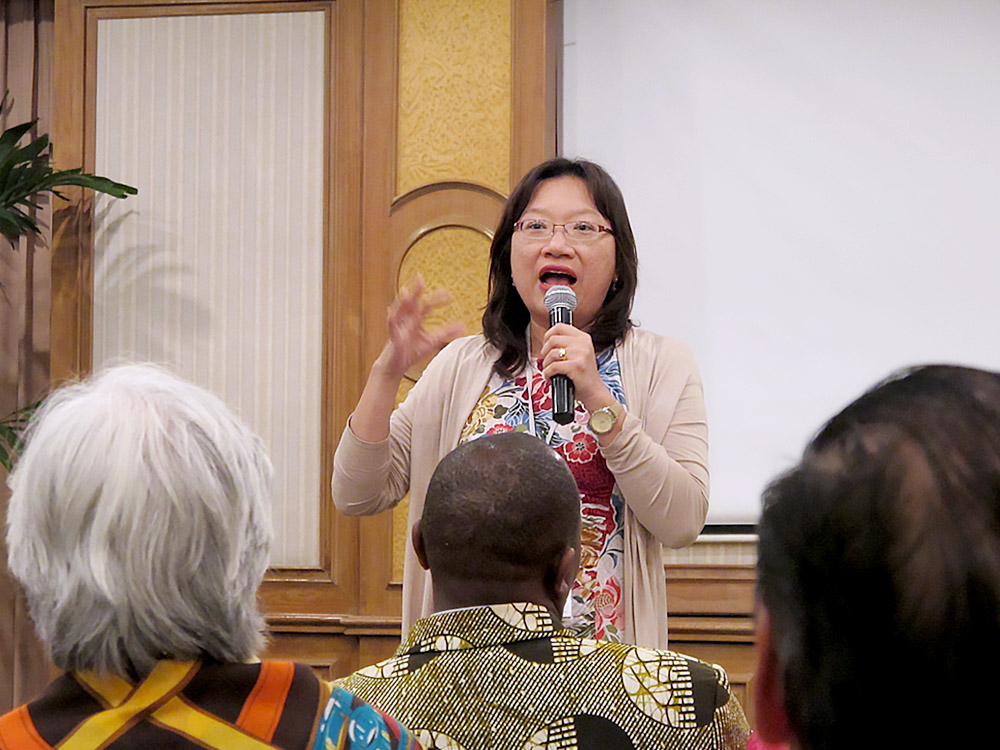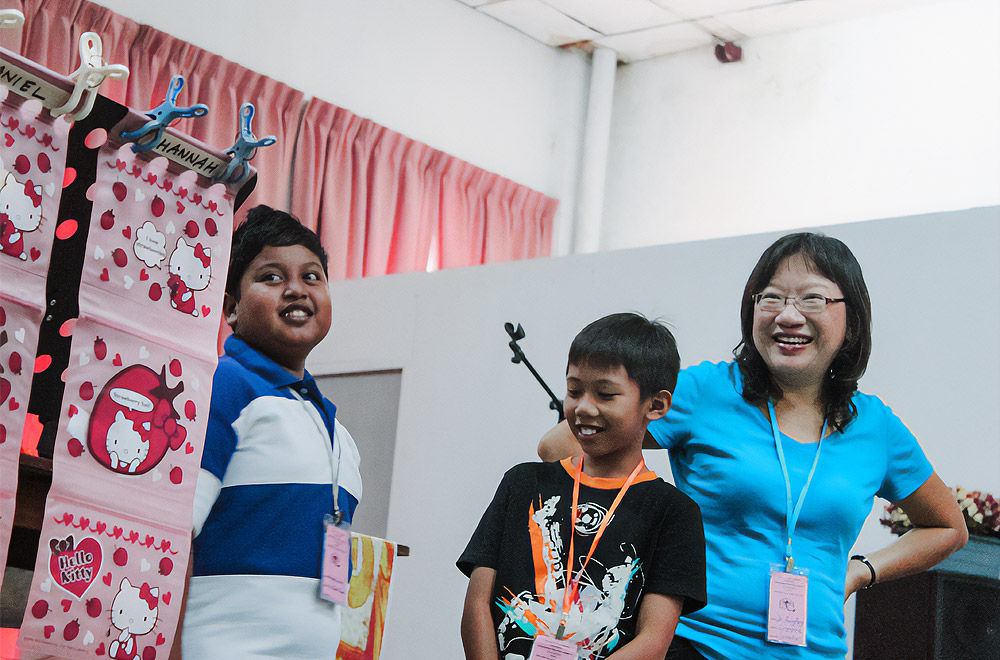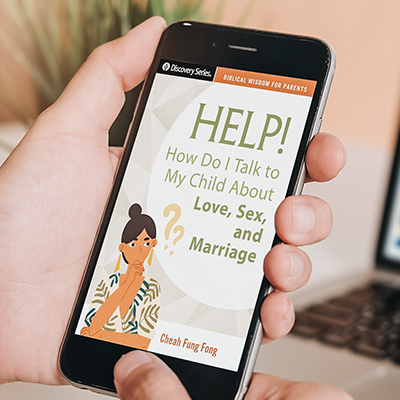
Cheah Fung Fong’s children were hardly in their teens when she heard about a new MTV series that many young people were talking about. It featured—she was told—sexuality, drug abuse, and other controversial behaviour targeted at a teenage audience. When she went home to ask her kids if they knew of it, one of her daughters rolled her eyes in response.
“Duh,” she said. “My whole class is watching it.”
When asked if she was watching it too, the girl replied, “Nah, I’m not interested.”
Fung Fong knew she could trust her children to tell her the truth. But the incident opened her eyes to the fact that they were being exposed to a lot of information about sexuality at an early age. It reminded her that parents today not only needed to start the conversation on the “bird and the bees” early, but also to keep it going through the growing years of their children if they want them to walk the godly path.
“If we don’t stay connected with them,” she says, “we won’t be able to mentor them and address any misperceptions about these issues.”
Give Us This Day 17
Get our latest family devotional!
Our latest devotional, Give Us This Day 17 is now available.Get a copy
Every month, we roll out a new resource for families. Subscribe to our email updates, and be the first to get a copy!
Early Exposure
Fung Fong, a medical doctor who has been actively serving in the children’s ministry in her church as well as denominationally at the Trinity Annual Conference of the Methodist Church in Singapore, is a passionate speaker on parenting issues. She is all too aware of what young children see, hear, and know.
She cites many “alarming” studies and statistics that show that children in Singapore are being exposed to matters of sexuality at a very young age because of modern communication and media. Kids as young as seven have been exposed to pornography, while some primary school children are already aware of what sex is. By the time they get to secondary school, some are already having sexual intercourse with their boyfriends or girlfriends, or practise “sexting” (exchanging sexually explicit messages or photographs) as part of their dating.
“With access to far more information than older generations ever had, and at an earlier age, children today will be exposed to the concepts of dating, flirting, relationships, and intimacy much earlier,” she says. “In my generation, we had our first crushes on the opposite gender around the age of 11 or 12. Today, they know far more by then!”
Fung Fong also draws attention to the prevalent view that truth is relative, and right and wrong is decided by how people think and feel. “In an increasingly permissive—dare I say oversexed—culture, our children will find it increasingly difficult to understand and determine what is right and wrong,” she concludes.
“We need to give them the first messages about dating, sex, and relationships with people of the opposite gender.”
Adding to the challenge is that children today are reaching puberty earlier because of better nutrition.
But while they are developing physically faster, they may not be progressing at an equal pace emotionally and mentally, says Fung Fong. So they may be unable to understand and manage their feelings and physical desires.
That’s why she passionately believes that parents have to share the “first message” with their kids. “We need to start talking to our kids as early as possible,” she says. “We need to give them the first messages about dating, sex, and relationships with people of the opposite gender.”
Importance of the First Message
Fung Fong will always remember a scene from Jack Neo’s 2002 satire-comedy movie, I Not Stupid. After two primary school classmates, a boy and a girl, fall asleep next to each other during a rehearsal, their friends tease them and tell them that the girl is now pregnant. The boy panics and asks the adults around him about how babies are made, but they all avoid his question, leaving him anxious and fretful.
“If children don’t hear it from their parents, they’ll get the answers from their friends and from the internet,” says Fung Fong. “But these sources might be inaccurate or wrong. Or they may miss out the moral and spiritual angle.”
This is why, she says, parents need to be the first to give their kids the right information about love and sexuality.
“Before they hear from their friends, social media, movies and TV shows, we need to shape their understanding of love and sexuality,” she says. “As parents, we have this blessed privilege of being with our child from day one. Well before our kids touch their first phone or tablet, or log on to their Facebook or Instagram accounts, we should be their first source of knowledge, their first point of reference.”
This means making clear to them the Bible’s teaching on sexuality. “If we establish the plumb line of God’s Word in their lives, they will be able to assess and analyse any new knowledge with Scripture in mind,” says Fung Fong. “So it’s important to set godly principles in place.”
For example, she notes, parents can use Psalm 139:13–16 to assure their children that they are made “fearfully and wonderfully” (v. 14), exactly as God wants them to be. This will help children counter pressure to conform to worldly ideals of physical beauty.
Genesis 1:27 and 2:24, meanwhile, make clear the biblical stand on sex and sexuality—that God made people male and female, and that sex is to be enjoyed within the safe boundaries of marriage.
“Well before our kids touch their first phone or tablet, we should be their first source of knowledge, their first point of reference.”
The importance of the first message, she adds, is encapsulated in Proverbs 22:6: “Start children off on the way they should go, and even when they are old they will not turn from it.”
Never Too Early, Never Too Late
Fung Fong has been asked for advice on sexuality issues from teachers in primary school. “They had found their kids petting each other in secluded corners of the school,” she says.
Her point is: it is never too early to start the conversation on the birds and the bees. “I would say that it is not too early to talk to our kids about sex when they’re 12 years old or even younger.”
Fung Fong hesitates, however, to give exact ages. Different children develop at different ages, she notes, and parents are the best judge of whether their kids would be able to grasp the concepts.
“It is never too late to start talking about it, and your child will still benefit from an ongoing conversation about something that means a lot to him or her.”
“There is no one single age of awakening,” she explains. “It is a process that is closely tied to the onset of puberty, and changing hormones kicking off physical and emotional changes.”
But, she hastens to add, the conversation should start before a child enters the teenage years—“by that time, they would already have picked up information from elsewhere.”

At the same time, she also reassures parents who fear they have missed the boat. “Don’t worry if you haven’t had this conversation before your child has been exposed to these topics,” she says. “It is never too late to start talking about it, and your child will still benefit from an ongoing conversation about something that means a lot to him or her.”
Fung Fong herself started talking to her children about the biblical stand on sexual intercourse when they were aged about 4 or 5. “I told them the Bible story of how God created Adam and Eve, how they loved each other and got married, how God gave them a beautiful gift called sex to be enjoyed in marriage, and how new life is formed through it,” she says.
Later, she taught them about reproduction and the act of sex, using a picture book, meant for preschoolers, to teach them about how “Mummy laid an egg”.
Over the years, she developed the conversation further, to include issues such as attraction, flirting, petting, and purity.
“Like discipleship, sexuality education is a long-term process,” she points out. “We don’t have to make sure the lesson is understood every time, and we don’t have to deliver all the lessons at one go. We can ‘layer’ on more information as the child grows in understanding and maturity over the years.”
Keeping It Casual
When Fung Fong’s eldest child, John, was about 13 years old, he called her one day to ask her to pick him up from school early.
In the car, she asked him why, he replied, “Oh, Mum, don’t you know what day it is? It’s Valentine’s Day! Some of the boys asked Coach to cancel practice so that they could spend time with their girlfriends.”
Seeing an opportunity to start a conversation on the topic of dating, Fung Fong asked John about his friends and their girlfriends, before finally asking him: “How about you? When do you think is a good time to have a girlfriend?”
To her immense relief, he replied, “Maybe 16.”
Nodding, she then asked him, “Why do you think people date?” As he replied, Fung Fong gently prodded him, and they began talking about how people are physically attracted to each other.
Later, she also found openings to engage John on topics like infatuation, love, dating, and sexual intimacy.
Children are far more ready to listen and talk when the conversation relates to something they’ve just seen or heard.
Such “teachable moments”, says Fung Fong, are great times to teach children about sexuality. In fact, they are more effective than sitting kids down and starting an awkward conversation, she notes. Children are far more ready to listen and talk when the conversation relates to something they’ve just seen or heard.
“Instead of having a serious sit-down lecture, look for opportunities in daily life, such as when you walk past a fashion advertisement of a scantily-clad woman, or watch a TV show that hints at sex,” she says. “Then you can talk about how they portray sexuality issues, and lead the conversation into what the Bible has to say about it.”
But, she stresses, parents need to avoid turning the conversation into a lecture. Nothing, she adds, turns kids off more. “Let children lead the conversation,” she suggests. “Ask questions, and guide them to come up with the answers themselves. Conversation means helping a child to understand what is going on, and guiding him to come to a conclusion that is in line with God’s teaching.”
“I believe it is more important to keep communication lines open, rather than trying to push the message at every opportunity.”
When her children were younger, she would choose her battles, backing off whenever they appeared unwilling to listen. “I believe it is more important to keep communication lines open, rather than trying to push the message at every opportunity,” she says.
God Will Help Us!
For many Asian parents, sex is a taboo subject. “It can be awkward, uncomfortable, or even embarrassing,” acknowledges Fung Fong.
But, she adds, the conversation has to start somewhere, sometime. “We talk to our children about school, homework, exams, and CCA. So why not on sexuality?” she notes. “After all, it is an equally important part of their development. We should not stay silent about it.”
“We talk to our children about school, homework, exams, and CCA. So why not on sexuality?”
Deuteronomy 6:6–7, she notes, lays out God’s charge to parents to disciple their kids, bring them up in His way, and teach them what His Word says about everything:
These commandments that I give you today are to be on your hearts. Impress them on your children. Talk about them when you sit at home and when you walk along the road, when you lie down and when you get up.
Says Fung Fong: “As Christian parents, it is our responsibility to give our children a biblical worldview and biblical lens through which they can see and understand their identity and purpose in God. By talking to them about what the Bible says about sexuality, we can give them the plumb line that can guide them for the rest of their lives—not just through puberty and the throes of teenage angst, but even to their adult lives.”
“Nothing pleases God more than seeing us make an attempt to connect with our kids so that we can teach them His laws.”
And if all this sounds like an overwhelming responsibility, Fung Fong quickly adds that all parents have the ultimate guide to help them—God, the Heavenly Father of their children. Having chosen her to steward His children, she believes, God will give her the wisdom, patience, courage, and creativity to disciple them.
“Nothing pleases God more than seeing us make an attempt to connect with our kids so that we can teach them His laws,” she says. “After all, God loves our children even more than we do.”
She adds: “We can lean on God for help to teach our children, for they are His children. He will guide and lead us in this important work, open our eyes to the opportunities, and give us the heart to sense the prompting to talk to our children.”
 Fung Fong at a children’s ministry.
Fung Fong at a children’s ministry.
Fung Fong’s Tips on Talking to Your Kids about Sex
1. Stay comfortable
- Think of talking about sexuality like you talk about school work, morals, and values. You are teaching kids about body parts, reproduction, and Christian principles about relationships and purity.
- You don’t have to know everything before you start. You can find out some information first to gain confidence, or even discover the answers together with your kids, such as on the internet.
- Use books or videos that use cartoons or pictures, and read them with your children.
2. Stay connected
- Find out the latest trends and what your children are seeing and hearing on social media, so that you can engage them through topics that interest them.
3. Stay in communication
- Look for incidents and situations in daily life that offer an opportunity to talk about a related issue or lesson, for example, news about a pregnant relative, an article about sexual abuse, condoms at the supermarket, or questions about girlfriends/boyfriends.
- Don’t turn a conversation into a lecture. Listen to your child’s opinions, ask questions, and try to understand things from a young person’s perspective.
4. Stay consistent
- Be a good role model in the way you interact with the opposite gender. Children are always watching to see what we do, how we relate to others, what shows we watch, and so forth.
 |
Help! How Do I Talk to My Child About Love Sex and MarriageBy Cheah Fung Fong |




